

Cross-Cultural Naming Ceremonies: Rituals and Traditions from Around the World
In societies worldwide, naming ceremonies are pivotal events that embody cultural, spiritual, and familial values, marking an individual’s integration into the community and cultural heritage. These ceremonies, rich in tradition and symbolism, go beyond simple nomenclature to anchor individuals in their societal and historical narratives, reflecting collective aspirations and values passed through generations.
Names are laden with significance, acting as conduits for familial legacy, communal identity, and personal destiny. They are selected with care, often to honor ancestors or embody desired virtues, signifying the deep-rooted belief in the power of names to shape one’s path in life. For instance, the Yoruba’s ‘Isomoloruko’ in Nigeria and the Jewish naming tradition underscore the profound cultural and spiritual dimensions of naming, linking individuals to their ancestral roots and broader communal narratives.
Moreover, these ceremonies often encapsulate rituals that highlight the community’s moral and spiritual values, establishing the individual’s place within the larger cosmic order. The Hindu ‘Namkaran’ ceremony, for example, signifies the child’s entry into a world of knowledge and communal life, underpinning the belief in the transformative power of naming.
Thus, naming ceremonies serve as a vital cultural rite, affirming the individual’s place in the world and reinforcing the intertwined threads of personal identity, community belonging, and historical continuity.
African Naming Ceremonies
In the vast and culturally diverse continent of Africa, naming ceremonies are vibrant, deeply symbolic events that reflect the rich fabric of traditions and beliefs across different societies.. These ceremonies are not merely about giving a child a name but are a complex interplay of ancestral legacy, community values, and spiritual beliefs.
In many African cultures, a child’s name is considered a powerful encapsulation of identity, destiny, and the life forces that surround their existence. The ceremonies are typically held several days after the child’s birth, allowing time for the elders and parents to select a name that embodies the family’s hopes, the child’s anticipated characteristics, and the broader community’s cultural heritage.
For instance, among the Akan people of Ghana, the naming ceremony, known as ‘Outdooring’, takes place on the eighth day after birth. It involves the public presentation of the baby, where the chosen name is whispered into the child’s ear by an elder, symbolizing the conferring of identity. Names like ‘ Kwame ‘ (born on a Saturday ) or ‘ Abena ‘ (born on a Tuesday ) reflect the significance of the day of birth in Akan culture, signifying the child’s link to the universe’s cyclical nature.
Similarly, in Nigeria, the Yoruba community celebrates the ‘Isomoloruko’ ceremony, where names are chosen based on the family’s history, circumstances of the child’s birth, or aspirations for the child’s future. Names like ‘Ayotunde’ (joy has returned) and ‘ Olufemi ‘ (God loves me) are examples of how names are imbued with meanings and expectations.
In East Africa, among the Maasai , naming often occurs after the child has survived the early months of infancy, acknowledging the precarious nature of life and the community’s respect for its fragility. The names given, such as ‘Naserian’ (peaceful), reflect the child’s or the community’s experiences and aspirations.
These ceremonies are multifaceted, involving rituals, feasts, and music, each element underscoring the community’s beliefs and the vital role of the individual within it. The naming process itself is a communal decision, with input from extended family members and elders, emphasizing the child’s integration into the wider social and ancestral network.
African naming ceremonies thus embody a profound communal wisdom, linking the individual to their past, present, and future community. They are a celebration of life, continuity, and the collective hope of the people, manifesting a deep-rooted belief in the significance of names as bearers of identity, destiny, and heritage. Through these rituals, the individual is woven into the community’s fabric, anchored in a shared history and collective destiny.
East Asian Naming Traditions
In East Asia, naming traditions are imbued with centuries of cultural heritage, philosophical thought, and linguistic nuance. The practices in countries like China, Japan, and Korea are not only about bestowing a name but also about conveying a legacy of cultural identity and familial values. These traditions reflect a deep interconnection between the individual’s identity and the broader cosmic and social orders.
In China, the art of naming is a thoughtful process often involving the consultation of astrological charts, the family’s genealogy, and the principles of Chinese characters and their meanings. A Chinese name typically consists of a one-character family name followed by a one- or two-character given name. The given name is selected based on its sound, meaning, and the number of strokes needed to write it, with the belief that this will influence the child’s fortune. For example, names like ‘Li Wei ‘ (powerful) or ‘ Xiao Chen ‘ (morning light) reflect attributes parents wish to bestow upon their children.
Japanese naming customs similarly combine deep cultural and familial significance. Names are chosen based on their meaning, the way the characters look together, and their potential pronunciation and nickname variations. A unique aspect of Japanese names is the use of Kanji characters, which carry specific meanings and sounds. A name like ‘ Haruto ‘ (sun flying) signifies a parent’s wish for their child to have a bright and prosperous future.
In Korea, the naming process is deeply rooted in family history and cultural tradition. Korean names usually consist of a one-syllable family name followed by a two-syllable given name. The given names are often chosen based on their meanings and the harmony between the syllables. Many parents consult with professional naming experts to select a name that balances the five elements of nature and aligns with the child’s birth date and time. Names such as ‘Ji-woo’ (wisdom and universe) or ‘Seo-yeon’ (auspicious and beautiful) are examples of this careful selection process.
East Asian naming ceremonies may vary in their specifics but they share common themes of honoring ancestral lineage, integrating with the natural order, and embedding societal values within the individual. These ceremonies are not merely celebratory events but are seen as pivotal moments that define the child’s path in life, connecting the new generation with the old, and intertwining personal destiny with collective heritage.
Indigenous American Naming Practices
Indigenous American naming practices encompass a wide range of traditions reflecting the diverse cultures and spiritual beliefs of the numerous tribes and communities across North and South America. These practices are deeply intertwined with the natural world, spiritual beliefs, and communal identity, often carrying profound meanings and serving as a vital link between the individual and the collective cultural heritage.
In many Indigenous American cultures, names are considered to carry the essence of a person’s character and destiny. They are often given in a ceremonial context, where the chosen name reflects the individual’s personality traits, expected life path, or the circumstances of their birth. For instance, among the Lakota people, names such as ‘ Wamblee ‘ (Eagle) or ‘Tȟatȟáŋka’ (Buffalo) are given to convey the strength and spirit of these respected animals, symbolizing the qualities that the community hopes the child will embody.
Naming ceremonies among Indigenous American communities are not only about bestowing a name but also about integrating the individual into the wider universe and acknowledging their role in the continuity of the cultural legacy. For example, the Navajo (Diné) people conduct a ceremony called the ‘First Laugh Ceremony’, where the child is given a name after they laugh for the first time, signifying their readiness to engage with the world around them.
In the Amazonian regions, tribes like the Yanomami give names that are closely tied to nature and the environment, reflecting the deep connection between the community and the natural world. These names, often related to animals, plants, or natural phenomena, are considered to have protective and totemic powers. Names such as ‘ Korihor ‘ (meaning related to a specific animal or plant) embody the spiritual and physical bond between the individual and the natural world.
Furthermore, in many Indigenous cultures, names can change throughout a person’s life, reflecting significant life events, achievements, or transformations in personal identity or social status. This fluid approach to naming illustrates the dynamic relationship between the individual and the community, where names are both a reflection of the individual’s life journey and a testament to their evolving role within the society.
Indigenous American naming practices are a rich mosaic of cultural and spiritual expressions, highlighting the intricate relationship between identity, community, and the natural and spiritual worlds. These practices underscore the belief in the power of names to shape destinies, connect individuals to their ancestral roots, and carry forward the collective wisdom and heritage of the community. Through these naming traditions, Indigenous American cultures continue to celebrate and preserve their rich cultural identities and spiritual legacies.
European Naming Customs
European naming customs are a reflection of the continent’s rich historical and cultural diversity, influenced by centuries of tradition, migration, and intercultural exchange. These customs vary significantly across regions, each carrying its own set of practices, meanings, and significance tied to cultural heritage and family lineage.
In Western Europe, baptismal names have traditionally held great importance, often reflecting the Christian heritage of the region. Names like ‘ John ‘ (from the Hebrew Yohanan, meaning “graced by God”) and ‘ Mary ‘ (of Hebrew origin, meaning “beloved” or “sea of bitterness”) have been popular for centuries due to their biblical significance. In many European cultures, it is common to name children after saints, with the belief that the child will inherit the saint’s virtues and protection. For instance, in Italy, names like ‘ Francesco ‘ (in honor of Saint Francis of Assisi) and ‘ Giulia ‘ (a feminine form of Julius, recalling Saint Julian) are widespread.
In Eastern Europe, naming conventions often reflect a deep connection with the Slavic heritage and Orthodox Christian traditions. Names like ‘ Ivan ‘ (John in Russian and other Slavic languages) and ‘ Natalia ‘ (meaning “birth” in Latin, popular in Russia and Eastern Europe) are common. These names are frequently celebrated on name days, a tradition where individuals celebrate the feast day of the saint they are named after, a practice particularly prevalent in countries like Greece, Poland, and Russia.
In the Nordic countries, names often have roots in the Viking and Norse traditions, carrying meanings related to nature, mythology, and ancient gods. For example, names like ‘ Erik ‘ (meaning “sole ruler” or “eternal ruler” in Old Norse) and ‘ Astrid ‘ (meaning “divinely beautiful” in Old Norse) are popular. These names not only reflect the natural environment but also the historical and mythological narratives that shape these societies.
In the British Isles, naming practices have been influenced by a mixture of Celtic, Anglo-Saxon, and Norman traditions, resulting in a diverse palette of names. Names like ‘ William ‘ (of Old Norman origin, meaning “will helmet” or “protection”) and ‘ Elizabeth ‘ (from the Hebrew Elisheva , meaning “God is abundance”) have long been popular, reflecting the layered history of the region.
Additionally, in Southern Europe, particularly in countries like Spain and Portugal, names often have Latin or Iberian origins, and it’s common to use compound names, combining two or more given names. For example, ‘ Maria José ‘ (combining Mary, from Hebrew, meaning “beloved” or “rebellious,” with Joseph , also of Hebrew origin, meaning “He will add”).
European naming customs are thus a rich blend of historical, religious, and cultural influences, reflecting the continent’s complex heritage and the diverse identities of its people. These naming practices are not just about personal identity but are deeply entwined with social, religious, and familial ties, showcasing the multifaceted nature of European cultural traditions.
South Asian Naming Rituals
In South Asia, naming rituals are deeply embedded in the region’s rich melange of cultures, religions, and languages, reflecting a complex interplay of historical, spiritual, and social factors. These rituals, steeped in ancient traditions, are not merely acts of naming but are profound ceremonies that connect the individual to their familial, cultural, and cosmic origins.
In Hindu culture, the Namkaran ceremony is a pivotal rite of passage, typically occurring on the 11th or 12th day after birth. This ceremony involves the child’s first formal presentation to the gods and the wider community, where the chosen name is whispered into the baby’s ear by a senior family member. The selection of the name is a thoughtful process, often guided by astrological considerations, including the position of stars and planets at the time of birth, to ensure the name harmonizes with the child’s destiny. Names like ‘Aarav’ (meaning “peaceful” in Sanskrit) and ‘Saanvi’ (a name of Goddess Lakshmi ) are chosen for their auspicious meanings and the positive traits they are believed to bestow upon the child.
In Islamic communities in South Asia, particularly in countries like Pakistan and Bangladesh, naming ceremonies are also significant, with the Aqiqah ceremony taking place on the seventh day after birth. The ceremony involves the sacrifice of a sheep or goat, and the baby is given a name, usually selected from the Quran, reflecting virtues or historical figures that parents hope the child will emulate. Names such as ‘ Fatima ‘ (daughter of the Prophet Muhammad) and ‘ Ali ‘ (cousin and son-in-law of the Prophet Muhammad) are popular, signifying deep respect for Islamic history and teachings.
Sikh naming ceremonies, known as ‘Naam Karan’, occur within the first few weeks of birth, usually in a Gurdwara after a prayer session. The baby’s name is chosen based on the first letter of a randomly selected verse from the Guru Granth Sahib, the Sikh holy book. This practice reflects the central role of divine guidance in the life of the individual, with names like ‘ Harpreet ‘ (meaning “love of God”) and ‘ Simran ‘ (meaning “meditation”) denoting the spiritual and virtuous life that parents envisage for their child.
In Buddhist communities, particularly in countries like Sri Lanka and Nepal, naming is often influenced by astrological factors and the child’s birth chart. Names are chosen for their meanings and the positive energies they are believed to attract. For example, ‘ Karma ‘ (meaning “action” or “deed” in Sanskrit) is a name that reflects the fundamental Buddhist principle of cause and effect.
South Asian naming rituals, therefore, represent a confluence of the celestial, the spiritual, and the communal, embodying the region’s diverse cultural ethos and philosophical beliefs. These ceremonies are not just about naming but are integral to the social and spiritual introduction of the child into the community, marking the beginning of a lifelong journey of cultural and religious identity. Through these rituals, the intricate bond between the individual and the broader cosmic and cultural forces is affirmed, showcasing the profound significance of names in shaping personal and communal identity.
Middle Eastern Naming Conventions
Middle Eastern naming conventions are a rich amalgam of historical, religious, and cultural influences that reflect the diverse collage of societies within the region. These conventions are deeply intertwined with Islamic, Christian, and Jewish traditions, demonstrating the profound spiritual and cultural significance attributed to names.
In Islamic cultures, which predominate much of the Middle East, names are often chosen for their meanings and the virtues or historical figures they represent. Islamic naming practices typically involve the selection of names that have a positive connotation and are recommended in the Quran or signify the virtues of prophets and other esteemed figures. For example, ‘Mohammed’, named after the Prophet Muhammad, is one of the most common names in the region. Other popular names include ‘ Ahmed ‘ (highly praised) and ‘Fatima’ (a daughter of the Prophet Muhammad ), reflecting the deep-rooted reverence for Islamic history and teachings.
In Christian communities within the Middle East, such as in Lebanon, Egypt, and parts of Syria, names are often biblical, with parents choosing names like ‘ George ‘ (after Saint George) or ‘Mary’ (the mother of Jesus). These names carry with them centuries of religious and cultural heritage, embodying the Christian faith and its values.
Among Jewish communities, particularly in Israel and parts of the Middle East, naming after deceased relatives is a common practice, honoring the memory and legacy of family members. Names such as ‘ David ‘ (beloved) and ‘ Sarah ‘ (princess) are prevalent, reflecting the historical and spiritual significance of these figures in Jewish tradition.
Naming ceremonies in the Middle East often coincide with religious rituals, such as the ‘Aqiqah’ in Islam, where the child is officially named on the seventh day after birth in a ceremony that involves a sacrifice and a feast. In Jewish tradition, the ‘Brit Milah’ (circumcision ceremony) for boys on the eighth day after birth also serves as an occasion for naming, while girls are named during a ‘Zeved Habat’ or ‘Simchat Bat’ ceremony in the synagogue or at home.
These conventions are not just about the act of naming but are integral to the child’s initiation into the religious and cultural life of the community. They signify the child’s entry into a continuum of faith and tradition, linking them to their ancestors and the collective memory of their people.
Modern Adaptations and Global Influences
In the contemporary era, naming practices are increasingly reflecting a blend of traditional values and modern, global influences. As societies become more interconnected through migration, travel, and communication technologies, the pool of names from which parents draw inspiration has expanded significantly, leading to a rich diversity in naming conventions across the world.
The influence of popular culture is particularly evident, with names from international celebrities, literary characters, and media franchises gaining popularity across different cultures. For instance, names like ‘ Arya ‘ and ‘Khaleesi’ surged in popularity following the success of the television series “Game of Thrones,” showcasing the impact of global media on naming trends.
Moreover, the digital age has facilitated access to a wealth of information on names and their meanings, enabling parents to select names from different cultures that resonate with them personally, regardless of their own cultural or ethnic background. This has led to an increase in cross-cultural naming, where names such as ‘ Mila ‘ (of Slavic origin, meaning “gracious, dear”) and ‘ Kai ‘ (with meanings in several cultures, including “sea” in Hawaiian and “forgiveness” in Japanese) are chosen by parents from non-related cultural backgrounds.
The trend towards unisex and gender-neutral names is also a significant aspect of modern naming conventions, reflecting changing attitudes towards gender identity and expression. Names like ‘ Alex ‘, ‘ Charlie ‘, and ‘ Jordan ‘ are increasingly popular for children of any gender, symbolizing a move towards more inclusive and flexible understandings of identity.
Furthermore, the global mobility of people has led to the adoption and adaptation of names from one culture into another, often resulting in modified spellings or pronunciations to suit the linguistic and cultural context of the adopting country. For example, the name ‘Sofia’, of Greek origin meaning “ wisdom ,” is popular in various forms across different cultures, such as ‘ Sophia ‘ in English-speaking countries and ‘Zsófia’ in Hungary.
Environmental and socio-political influences are also reflected in modern naming practices, with names inspired by nature, ecological movements, and political ideals gaining prominence. Names like ‘ River ‘, ‘ Sage ‘, and ‘Liberty’ are examples of this trend, representing a broader societal shift towards sustainability and social justice.
Exploring global naming traditions reveals the profound impact of names in shaping identity and social bonds. These traditions, from Africa’s ancestral ceremonies to East Asia’s deliberate name choices, highlight the deep cultural and spiritual connections names forge. In the Americas, names bridge the gap between individuals and nature, while European and Middle Eastern practices emphasize the preservation of heritage and faith . The adaptability of naming conventions in response to modern influences showcases a world moving towards greater diversity and inclusivity. Names like ‘Aarav’, ‘Mila’, ‘Mohammed’, and ‘River’ reflect the personal and collective stories that shape societies. In essence, naming is a universal rite, reflecting the values and histories of cultures worldwide, and plays a crucial role in the continuity of human heritage and identity.
🎨 Generate an image for your avatar
- My Favorites
AMERICAN WEDDINGS BLOG
Stay up to date with the latest wedding ceremony trends, script writing inspiration, tips and advice for first-time officiants, and news that matters to couples and wedding ministers.
BLOG CATEGORIES
Trending tags, share this article.
other rites professional officiants religion and rituals wedding and ceremony planning
‘Naming Ceremonies’ at Any Stage of Life: How Celebrants Create Space for Authentic Identity
Published Monday, Nov. 22nd, 2021
Written by Jessica Levey
Learn about the Naming Ceremony tradition for adults at any stage of life, and how Celebrants and Officiants create space for authentic identity through this important ritual. Like christenings and zeved habat, naming ceremonies are part of both spiritual and secular traditions.

A Naming Ceremony or ritual can be celebrated at any age, including as an adult, as a way to honor the authentic self.
A ‘naming ceremony’ is the celebration of an individual being given (or announcing) a new name while in the presence of loved ones and community, and can take place at any age.
Common examples of this are a christening ceremony, when a child born into a Christian family is given a first name during their baptism ; and the Zeved habat (or Simchat Bat ), when a daughter born into a Jewish family is named.
All cultures have their own unique versions of the naming ritual. Some of them, like christenings and the Zeved habat , are part of a spiritual tradition, while others are simply secular community celebrations with no religious or spiritual aspects.

Naming ceremonies can be celebrated at any age and any stage of life.
Although most common for children, these ceremonies are also held for adults, whenever an individual chooses a new name to reflect their most authentic self.
In some Native American naming traditions , for example, individuals are given many different names throughout their life, as a way to reflect significant changes in their personality or individual abilities and strengths. And in Druid communities, some adults participate in Naming Rites to celebrate a time of healing and rebirth after making it through a particularly difficult period of life.
Common elements of a Naming Ceremony:
- Close friends and family gather together
- Wishes or blessings are given to the individual being named (or announcing a new name)
- Calling out the new name in recognition and joy
- Group participation in symbolic gestures such as casting wishing stones, candle lighting, tree planting, or chanting
Why would an adult choose a new name?
When we’re given a name as a child, it reflects our parents' values and hopes for us, but it’s not always a match for the adult we become. It might be a family name that’s been passed down through generations. Or an aspirational name that our parents hope we’ll grow into one day. And most names are gendered, given to us based on whatever gender is assigned to us when we’re born.
Sometimes we’re given a name we learn to love, or at least learn to appreciate. But sometimes we’re given a name that never matches up with our authentic identity, how we see ourselves or how we want the world to see us. Other times we outgrow an old name and want a new one that fits who we are now, or we simply like the sound of a certain name better than the one we have.
Luckily, we aren’t stuck with a name we don’t want!
Some individuals choose to change their name legally, and every state offers a process for changing a first, last, or full name. Others might choose to simply go by a new name in their day to day lives, such as when introducing themselves at work or with friends.

Naming ceremonies are as individual as we are.
They can take place indoors or outdoors, and be casual or formal.
The unique role of Celebrants in naming rituals
Celebrants and officiants are masters of marking time, and of cultivating meaningful rituals to celebrate life’s most important transitions. They create deeply personal, custom rituals based on the personality and needs of the individual. This means a skilled celebrant or officiant can plan a naming ceremony that’s casual, formal, big, or small… and anything in between.
While legally changing a name is deeply empowering -- submitting paperwork is not a party .
Celebrants give individuals and their communities the opportunity to celebrate a name change in a festive way, giving this important moment the fanfare and attention it deserves... whether they choose to legally change their name or not.
A Real-world example
Renowned Humanist Celebrant Donna Forsythe recently found inspiration through the Bradbury-Sullivan LGBT Community Center in Allentown, PA, to offer free Naming Ceremonies for members of the transgender and queer communities in her area.
This special service has been warmly received by folks of all ages.
Donna tells AMM that people have come up to her at various Pride events, saying “I wish there had been something like this for me,” and, “This is something that my parents would really love!”
She explains that the scale and style of a ceremony is truly up to the person celebrating. As with wedding ceremonies and other types of celebrations, celebrants have the opportunity to form a close relationship with the individual and to create something meaninful and personal:
“It can be a dozen people at most '' she says, describing the various ways a naming ceremony can look, such as a small gathering with the people closest to you. “It doesn’t have to be formal.” And naming ceremonies can incorporate any kind of smaller ritual, from written messages, to wishing stones, to soil blending ceremonies for tree plantings.
At their heart, she says, naming ceremonies are about acknowledging a transition in life “on your own terms.”

She’s the Program Founder and Director for the Celebrant Academy , Vice President of The Humanist Society Board of Directors , and owner of Lehigh Valley Celebrants , a professional wedding service in Pennsylvania.
(Find her: @celebrantacademy & @lehighvalleycelebrants on Instagram)
For most of her career, Donna was an inner-city educator. Then, in 2014 the same-sex marriage ban was lifted in Pennsylvania. Within days she officiated her first wedding, marrying two men in their 70s. Her career path changed its trajectory and she became a full-time celebrant soon after that.
Two years ago, Donna opened the virtual doors to Celebrant Academy , a comprehensive training program for professional celebrants and officiants in the US.
Wait, why are we talking about Naming Ceremonies on American Weddings?
We spend a lot of time talking about wedding ceremonies here on the American Weddings blog. This makes sense... Wedding ceremonies (and wedding officiants) are awesome! And they’re our primary focus and passion.
But AMM Ministers don’t just marry people. When they choose to, their roles can extend much further, supporting their communities in important ways and celebrating not just new beginnings, but life's most important transitions, too. This deserves to be highlighted!
Ordination through American Marriage Ministries gives our ministers all of the same rights and protections held by ministers ordained through traditional brick-and-mortar churches. As an AMM Minister (or Reverend, Pastor, or Officiant, whatever title you choose), your right to conduct religious ceremonies of all forms is protected by the religious non-establishment clause of the first amendment. While many of our ministers only conduct wedding ceremonies, others also conduct baptisms, funerals, baby blessings, and other meaningful rites.
Learn more about what it means to be an AMM Minister by visiting our FAQ page .
You might also like: .
- How to Officiate a Funeral or Memorial Service
- How to Baptize Someone (and Why They Might Ask You To)
- The Javanese Siraman Wedding Ritual - An Illustrated Look

Lead Staff Writer & Illustrator
Jessica loves exploring the history and magic of ritual, the connections between people and places, and sharing true stories about love and commitment. She's an advocate for marriage equality, LGBTQ+ rights, and individuality, and is an ordained Minister with AMM. When she’s not writing or illustrating for AMM, she enjoys city hikes, fantasy novels, comics, and traveling.
Last Article:
Next Article:
How To Officiate By State

Who Will Officiate Your Wedding?
Choose Your Officiant with our "Will You Marry Us?" Gift Package.

Signature Wedding Officiant Package
Our premiere package contains everyting you need to officiate like a pro.
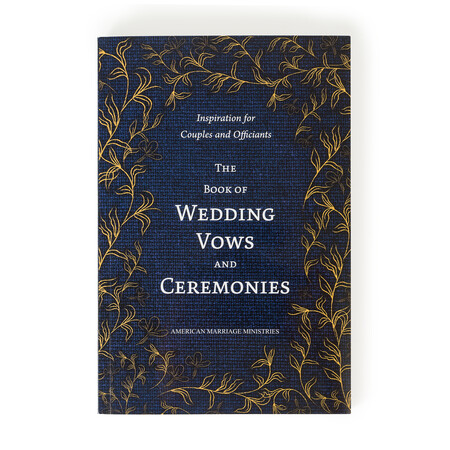
The Book of Wedding Vows and Ceremonies
It's finally here! Timeless scripts and heartfelt vow inspiration to bring life to your ceremony.
Professional Wedding Officiant Certification Course
Learn from the Pros to Officiate with Confidence!
POPULAR ARTICLES

Hawaii wedding pros say limits lead to dangerous ‘rogue weddings’

Indiana lawmakers introduce bill to protect same-sex marriage in 2023

From Volunteer Marriage Commissioner to AMM Minister: How a San Francisco wed...

12 Amazing Marvel Wedding Themes: Avengers, Black Panther, GOTG, and more

When will same-sex marriage be codified? (And what does that even mean?)

Britney didn’t invite her mom to the wedding. Do you have to invite yours?
Donate to amm.
Your generosity keeps American Marriage Ministries running.

Wedding Officiant Training
Everything you need to know to officiate.
Sample Wedding Ceremony Scripts
Need inspiration? Check out our free ceremony scripts!
Subscribe To Our Newsletter!
Become a Wedding Officiant with Our Free Online Ordination!
You have no items in your basket

- Event Planning
Writing a Naming Ceremony Speech

- Facebook Share on Facebook
- Twitter Share on Twitter
- Pinterest Pin it
A Naming Ceremony is a really important moment in your child's life – and an important memory for the family as a whole. It is the moment that you officially welcome a new person into the family in front of everyone you love, and a lot of people choose to give speeches at a Naming Ceremony. If this is something that you plan on doing, here's our guide to writing a Naming Ceremony speech for you little one's special day.
First off (and just like a wedding!) you should thank everyone for coming to the event. Give special thanks to anyone who has had to come a long way to be with you. It is also a good idea to thank the priest or celebrant for the ceremony that he/she has delivered.
Next up, say a little something about how important it was for you to have a naming ceremony for your child, and also how special it was that your child is now a part of your life. Don't forget any existing children that you may have - it's very easy to get jealous when a whole day is being dedicated to their new sibling! Give them a special mention and tell them how well they are doing at being a new big brother/sister.
Once everyone has been mentioned in some way, you should then mention about your hopes for your child's future, and wishing or praying over them for happiness and health. Make reference to how everyone there with you can help this new little person to grow and thrive in your family.
Lastly, ask everyone to raise their glasses and toast to the child’s future health and happiness.
Advice for every occasion!
- adult birthday
- anniversary
- beach wedding
- Category_event-planning
- christening
desk stationery
- dotty about paper
- Father's Day
- horse riding party
- kids birthday
- mermaid party
- Mother's Day
- naming ceremony
- National Days
- new year's eve
- pamper party
- pirate party
- princess party
- science party
- space party
- superhero party
- surprise party
- swimming party
- teddy bear party
- unicorn party
- valentine's day
- wedding ceremony
wedding etiquette
- wedding ideas
- wedding planning
- wedding reception
- wedding trends
What To Write (Birthday)
- What To Write (Occasions)
Recommended Articles
June 29, 2024
Category_event-planning ,

July 25, 2023

April 25, 2023
kids birthday ,
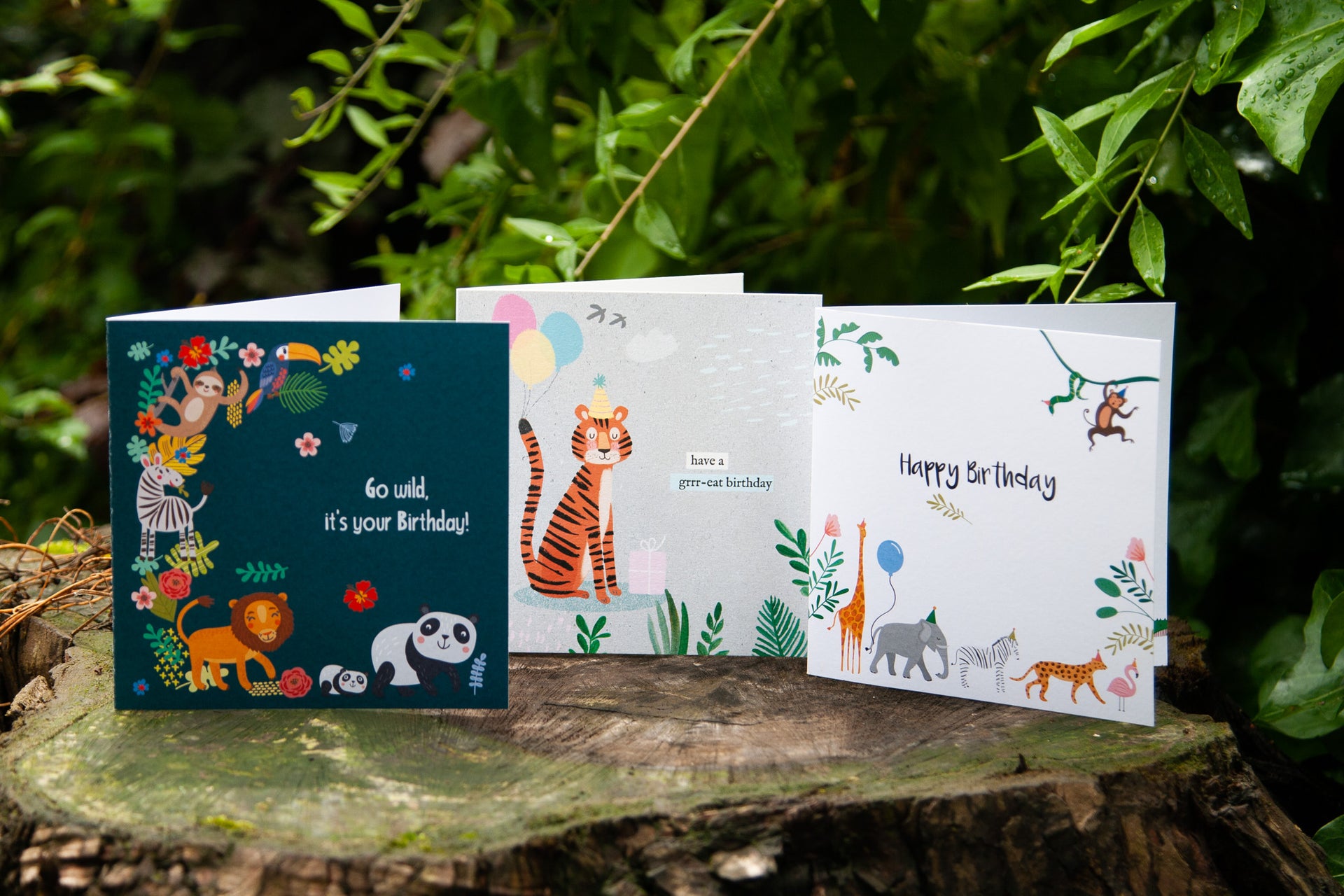
Home — Essay Samples — Sociology — Names — Name and Identity: Significance of Names in African Society
Name and Identity: Significance of Names in African Society
- Categories: Cultural Identity Names
About this sample

Words: 1300 |
Published: Aug 4, 2023
Words: 1300 | Pages: 3 | 7 min read
Table of contents
Introduction, importance of name and identity in african culture, processes and traditions of name giving, impact of language and names on identity, works cited.

Cite this Essay
To export a reference to this article please select a referencing style below:
Let us write you an essay from scratch
- 450+ experts on 30 subjects ready to help
- Custom essay delivered in as few as 3 hours
Get high-quality help

Prof Ernest (PhD)
Verified writer
- Expert in: Sociology

+ 120 experts online
By clicking “Check Writers’ Offers”, you agree to our terms of service and privacy policy . We’ll occasionally send you promo and account related email
No need to pay just yet!

Related Essays
3 pages / 1282 words
5 pages / 2439 words
3 pages / 1217 words
1 pages / 343 words
Remember! This is just a sample.
You can get your custom paper by one of our expert writers.
121 writers online
Still can’t find what you need?
Browse our vast selection of original essay samples, each expertly formatted and styled
Related Essays on Names
Hurston, Zora Neale. Their Eyes Were Watching God. Harper Perennial Modern Classics, 2006.
Does a person's name influence the person they become? This intriguing question delves into the complex interplay between identity, societal perceptions, and personal development. Throughout history, names have held [...]
In weaving the meaning of my name into the fabric of my identity, I reflect upon the deliberations my parents underwent upon my arrival into this world. When I was born, my parents couldn’t decide on what to name me – my dad [...]
Miller, Arthur. The Crucible. Penguin Books, 1953.Ciulla, Joanne B., et al. 'Reputation and integrity in the corporation.' Handbook of business ethics (2004): 255-276.Schlenker, Barry R. 'Impression management: The self-concept, [...]
Our names give an impression of who we are and can be very powerful in determining how people perceive others. The first impression people have about others is through their appearance. The second impression people have about [...]
You have names in this video is because sometimes names can be illegal if trying to give their kids the names we have on this list they are actually breaking the law in some countries because this is the top 10 illegal baby [...]
Related Topics
By clicking “Send”, you agree to our Terms of service and Privacy statement . We will occasionally send you account related emails.
Where do you want us to send this sample?
By clicking “Continue”, you agree to our terms of service and privacy policy.
Be careful. This essay is not unique
This essay was donated by a student and is likely to have been used and submitted before
Download this Sample
Free samples may contain mistakes and not unique parts
Sorry, we could not paraphrase this essay. Our professional writers can rewrite it and get you a unique paper.
Please check your inbox.
We can write you a custom essay that will follow your exact instructions and meet the deadlines. Let's fix your grades together!
Get Your Personalized Essay in 3 Hours or Less!
We use cookies to personalyze your web-site experience. By continuing we’ll assume you board with our cookie policy .
- Instructions Followed To The Letter
- Deadlines Met At Every Stage
- Unique And Plagiarism Free
Dream of becoming a celebrant? Find out if this could be for you...
How to become a celebrant & start a new business.
60 minutes of everything you need to know & learn how celebrancy can change your life. Wednesday, 30th October at 7pm BST
By signing up, you agree to receive more tips from The Academy of Modern Celebrancy. You can unsubscribe at any time. Privacy Policy
What is a naming ceremony?
Welcoming a newborn into the world is a momentous occasion filled with happiness and love. One beautiful way to celebrate the arrival of a child is through a naming ceremony, a tradition that dates back centuries and holds significant cultural and spiritual importance.
As a celebrant, the role of conducting a naming ceremony is a privileged and rewarding one, as it allows you to facilitate a meaningful and memorable experience for the child and their loved ones. In this blog, we will explore what a naming ceremony entails and delve into the numerous benefits of conducting one as a celebrant.
So what exactly is a naming ceremony? A naming ceremony is a non-religious, secular, or sometimes semi-religious ritual held to celebrate and introduce a newborn child to their family, friends, and community. It is an alternative to religious baptisms or christenings, making it inclusive and suitable for families of many different beliefs and backgrounds. The ceremony’s core purpose is to give the child their name and bestow blessings and wishes for their future.
The structure and elements of a naming ceremony can vary depending on cultural and personal preferences. Typically, the ceremony includes heartfelt speeches, readings, blessings, and rituals that reflect the family’s values and aspirations for the child. It is a beautiful way to officially introduce the child to their extended social circle, creating a sense of belonging and connection right from the start of their life’s journey.
The Role of a Celebrant in a Naming Ceremony
As a celebrant , you play a pivotal role in crafting and conducting a meaningful naming ceremony. Your responsibilities go beyond simply guiding the event; they involve connecting with the family, understanding their wishes, and creating a personalised ceremony that reflects the essence of their love and hopes for the child.
Personalisation: A key benefit of having a celebrant conduct a naming ceremony is the level of personalisation they bring to the event. Unlike traditional religious ceremonies with fixed rituals, a celebrant can tailor the entire ceremony to suit the family’s preferences and values. This makes the ceremony unique and resonant with the family’s beliefs and wishes.
Looking for Inspiration? Check out 7 Innovative Naming Ceremony Ideas for Celebrants
Crafting Meaningful Rituals: Rituals hold a special place in a naming ceremony, symbolising various aspects of life and family connections. As a celebrant, you have the opportunity to create rituals that are meaningful and relevant to the family, leaving a lasting impact on all those present.
Public Speaking and Hosting: A celebrant’s training equips them with public speaking and hosting skills, enabling them to officiate the ceremony with confidence and grace. Your ability to engage the audience and create a warm atmosphere contributes to the overall success of the event.
Emotional Support: Welcoming a new child into the family can be an emotional experience, and as a celebrant, you can offer support and comfort to the parents and other family members during the ceremony.
Benefits of Conducting a Naming Ceremony as a Celebrant
Creating Lasting Memories: As a celebrant, you have the privilege of playing a central role in creating lasting memories for the family. The ceremony’s personalised and heartfelt nature ensures that it becomes a cherished event, with stories and photos to be revisited and treasured for generations to come.
Celebrating Life and Love: A naming ceremony is not just about giving the child a name; it is a celebration of life and love. As a celebrant, you get to witness and participate in the joyous expression of love that family and friends shower upon the newborn.
Building Family and Community Bonds: The naming ceremony is a unifying event, bringing together family members and friends from near and far. As a celebrant, you facilitate the strengthening of family bonds and the forging of new connections within the community.
Contributing to Personal Growth: Being a celebrant for a naming ceremony offers opportunities for personal and professional growth. Each ceremony is a unique experience, teaching you valuable lessons in empathy, communication, and cultural understanding.
Honouring Family Traditions: Many families have their cherished traditions and customs that they wish to incorporate into the ceremony. As a celebrant, you can help preserve and honour these traditions, adding a sense of continuity and heritage to the occasion.
Spreading Positivity: In a world that sometimes feels overwhelmed by negativity, being part of a naming ceremony as a celebrant allows you to spread positivity, love, and hope. The positive energy generated during the event can have a ripple effect on everyone present.
A naming ceremony is a beautiful way to celebrate the arrival of a new child and welcome them into the world with love and blessings. As a celebrant, you have the unique privilege of playing a central role in creating a heartfelt and personalised ceremony that leaves a lasting impact on the family and community. The benefits of conducting a naming ceremony go beyond the event itself; they extend to personal growth, cultural preservation, and the spreading of positivity and love. Embracing the role of a celebrant in these joyous occasions enriches both the lives of the families involved and your own journey as a facilitator of love and connection.
Learn more about our naming ceremonies courses here .
Our team of writers and contributors at The Academy of Modern Celebrancy are dedicated to educating Celebrants and helping them build thriving Celebrant businesses. Our team is made up of Celebrants and Industry experts dedicated to sharing their expertise with you.
The Academy of Modern Celebrancy also has a thriving community of 2.8k celebrants that we are dedicated to helping grow their businesses and taking celebrancy from a hobby to a lifestyle.
AMC host the global celebrant summit, Celebrantopia, each year, where experts from the Celebrant world share their expertise and passion for Celebrancy.
The Academy of Modern Celebrancy has trained over 600 celebrants, and employs award-winning Celebrant Mentors who know what it takes to make it in the industry. We train the best celebrants out there across the UK, Europe and the USA.
Take the Quiz to find out if you have what it takes!
Not sure where to begin? Start here:
Are you a celebrant in the making.
Find out if you have what it takes to be a celebrant and if now is the time for you to start this new chapter.

Download the Ultimate Guide to becoming a Celebrant & find out how you can make this happen!

If you liked this article you may enjoy ...

What Is The Role Of A Funeral Celebrant?
If you’re considering a career in funeral celebrancy, you might wonder what the role of a Funeral Celebrant entails. At AMC, we pride ourselves on educating aspiring Celebrants in all areas of Celebrancy, ensuring you are a fully prepared, confident professional from the day you graduate. In essence, a funeral celebrant is a compassionate professional…
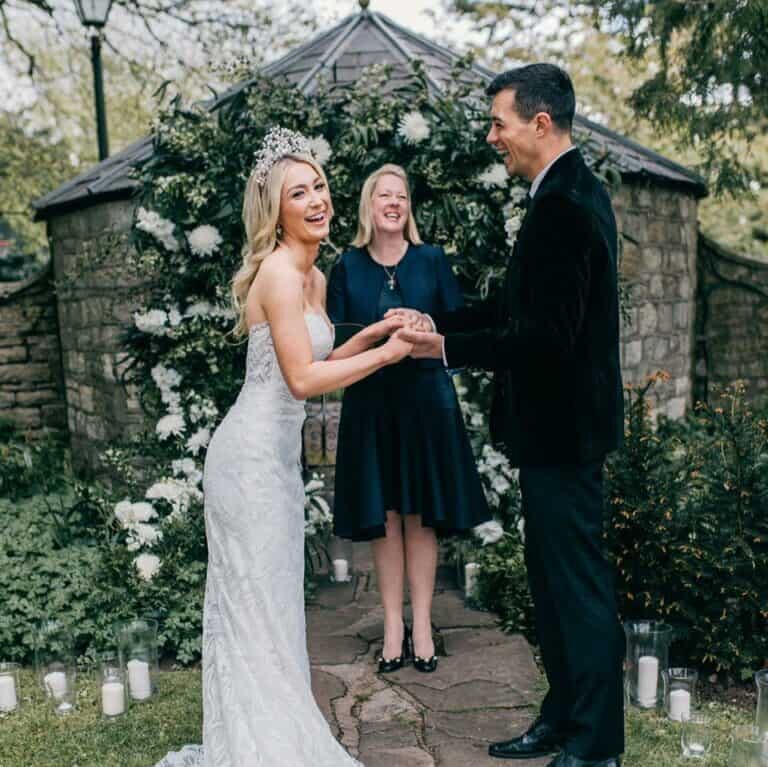
3 Steps to Launching Your Dream Wedding Celebrant Business
Hey there, future wedding celebrant extraordinaire! Ready to embark on a journey that’ll have you dancing down aisles and crafting love stories for a living? Buckle up, because we’re about to dive into the three essential steps that’ll transform you from a starry-edge dreamer to a full-fledged wedding celebrant powerhouse! 1. Ignite Your Passion with…

6 Things Modern Celebrants Do Differently
Gone are the days of stuffy, one-size-fits-all ceremonies. The world of celebrancy is evolving, and at the forefront of this exciting change is a new breed of celebrants who are redefining what it means to create and officiate meaningful life events. But first, let’s define modern celebrants: Modern Celebrancy Defined Contemporary and Current: Modern refers…

Naming Ceremonies
Your stories.
Get an email that automatically logs you in:
Or, log in via social media (if you have a role at Humanists UK, click 'Log in with Google')
Or, log in with a password:
Need some help?

Naming ceremonies | Non-religious rituals and symbolic actions
Welcoming a child into the family is one of life’s key milestones to be celebrated with family and friends. If you’re thinking of having a humanist naming ceremony , you might like to consider including one of these popular rituals or symbolic actions.
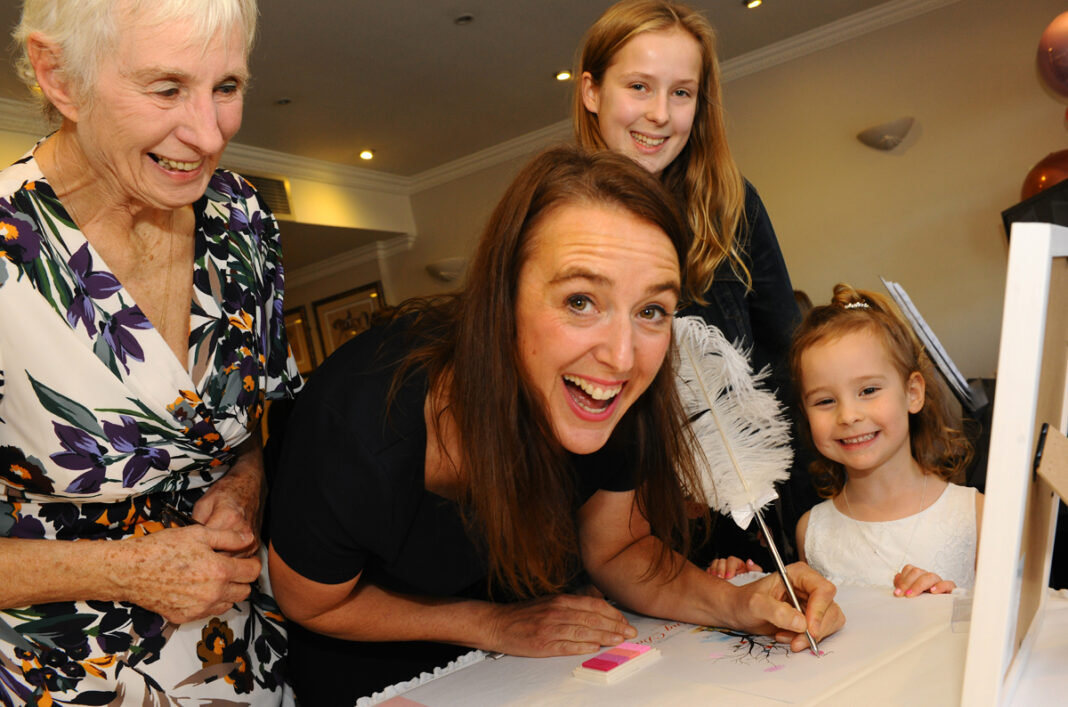
What is a ritual?
A ritual is a series of actions that are performed in a particular order, and they feature in all human societies to mark life’s key milestones such as birth, coming-of-age, marriage, and death. From exchanging wedding rings, to scattering ashes, rituals are part of humanist ceremonies of all kinds.
Rituals typically involve one or more of the following: the reciting of specific phrases, the making of vows or promises, objects, gestures, music, songs, dances, and special food and drink.
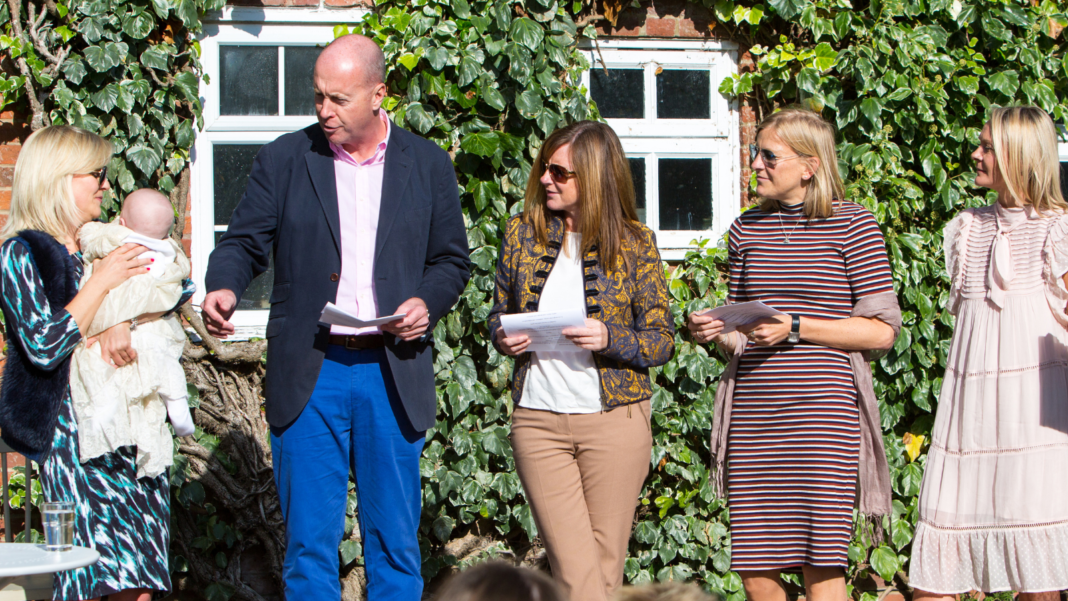
Why are rituals popular in humanist ceremonies?
The content of a humanist naming ceremony is not prescribed: each ceremony is personally created and it can include any words and actions that are of significance to you and your family.
Popular rituals at humanist naming ceremonies
- Signing a naming certificate
- Creating a family tree of fingerprints
- A candle-lighting ceremony
- A sand-blending ceremony
- Creating a tree of promises, advice, or good wishes
- Signing a guest book.
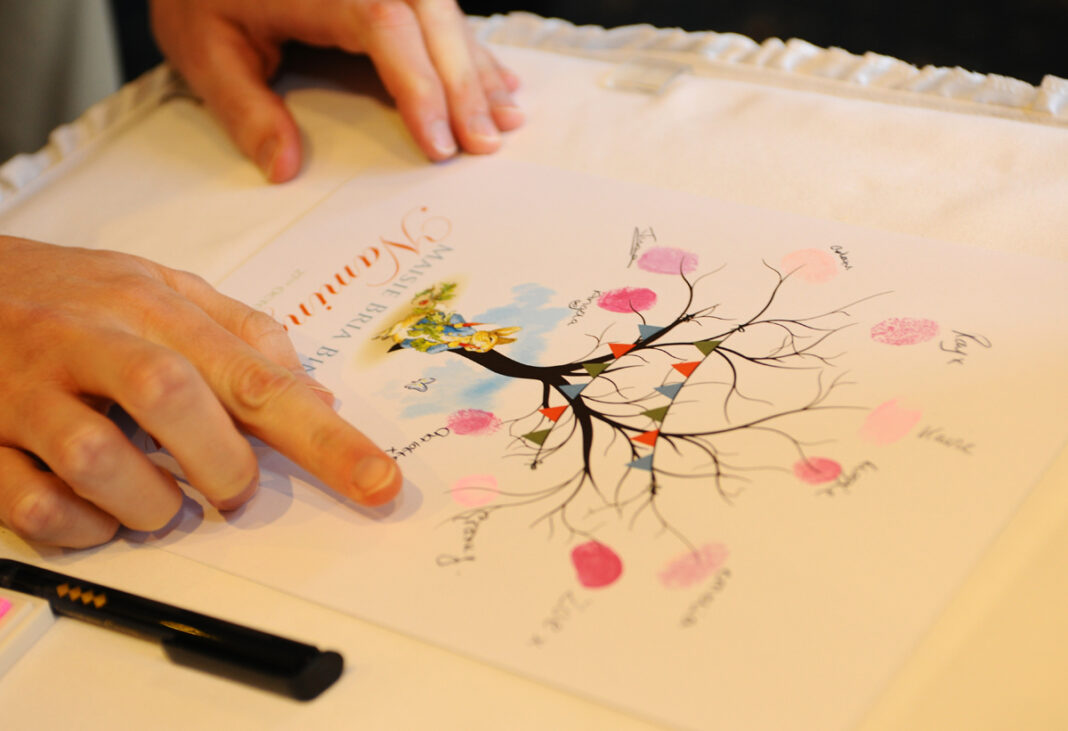
What is a symbolic action?
A symbolic action represents an idea or quality without using words; a symbol of something that, in and of itself, has no real effect, but which has meaning to participants and audience.
Why do we include symbolic actions in humanist ceremonies?
Throughout history, in art and literature, symbolism has been used to represent ideas or certain qualities. For example, a lion symbolises courage, and a butterfly can be used to symbolise a transformation. A wedding ring is a circle with no beginning or end: it’s the perfect symbol of eternity and completeness.
Symbolism is also attributed to colours and flowers – such as ‘red for passion’ and ‘roses for romance’. Each of these symbols gives us a kind of shorthand for feelings, qualities, and attributes.
Different cultural groups may have different associations with the same object. When choosing a symbolic act for your ceremony, it’s important to consider what it means to you and your guests.
These are the most common associations in the western culture, for the following colours:
White most often symbolises perfection, innocence, softness, and cleanliness.
Pink is associated with softness, sweetness, and love.
Blue is the colour of the ocean and the sky; it often symbolises serenity, stability, inspiration, wisdom or health. It can be a calming color, and symbolise reliability.
Yellow is often associated with sunshine or joy. Children tend to like this colour, and it is used to market products to children;
Green is most often used to represent nature, healing, health, youth, or fertility, since it is such a dominant colour in nature. It can be a very relaxing colour.
But, if your child has a favourite colour, that is reason enough to make it the theme of their naming day! Don’t forget, this is about your family and you can make your own symbols and traditions.
Popular symbolic actions for a humanist naming ceremony
- Tree-planting
- Planting seeds
- Gift-giving
Many families include rituals and symbolic actions in a ceremony to give meaning, structure, and inclusivity. For example, inviting all guests to write a promise to your child can be a great way of involving everyone in the ceremony, whilst also getting them to think about the relationship they want to have with your child as they grow. It is both inclusive and meaningful.
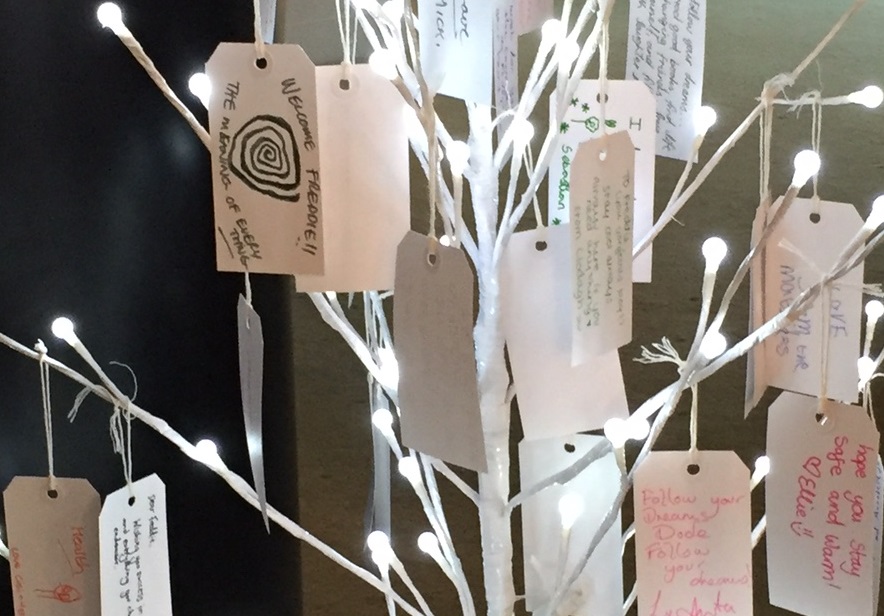
When planning a humanist ceremony, the deeper the symbolism, and the more guests that are involved, the more meaning an action will have for you and your family.
Planning a humanist naming ceremony
A humanist naming ceremony provides an opportunity for you to invite family and friends to gather together and welcome your child. Ceremonies are usually attended by the people most likely to be an enduring part of your child’s life as they grow up.
You may decide to invite a few close relatives and/or friends to become guidemothers or guidefathers and to make special promises at the ceremony.
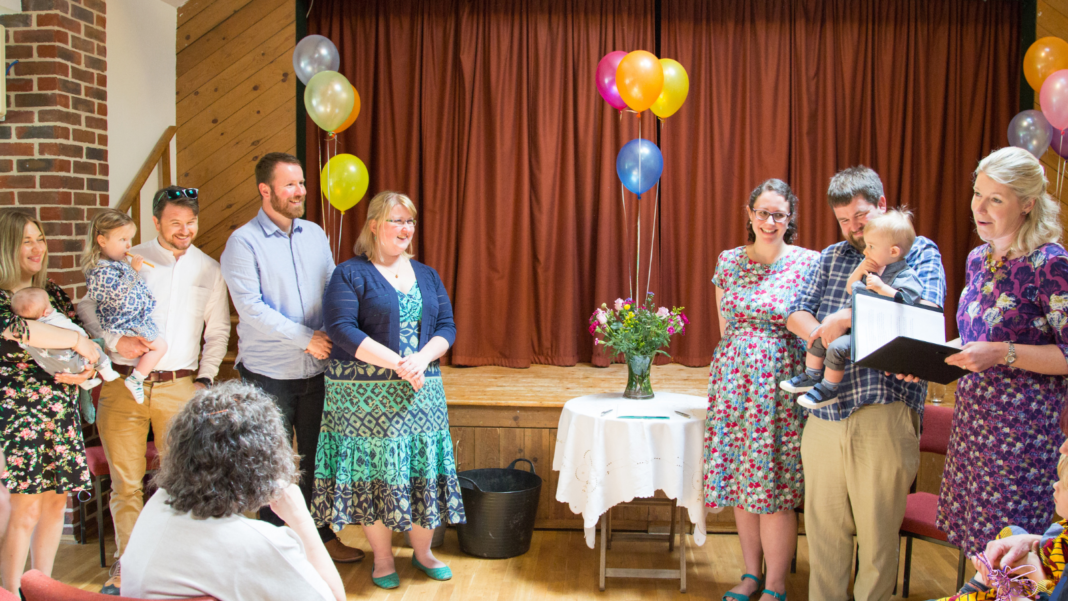
They may choose to give gifts or make promises to your child.
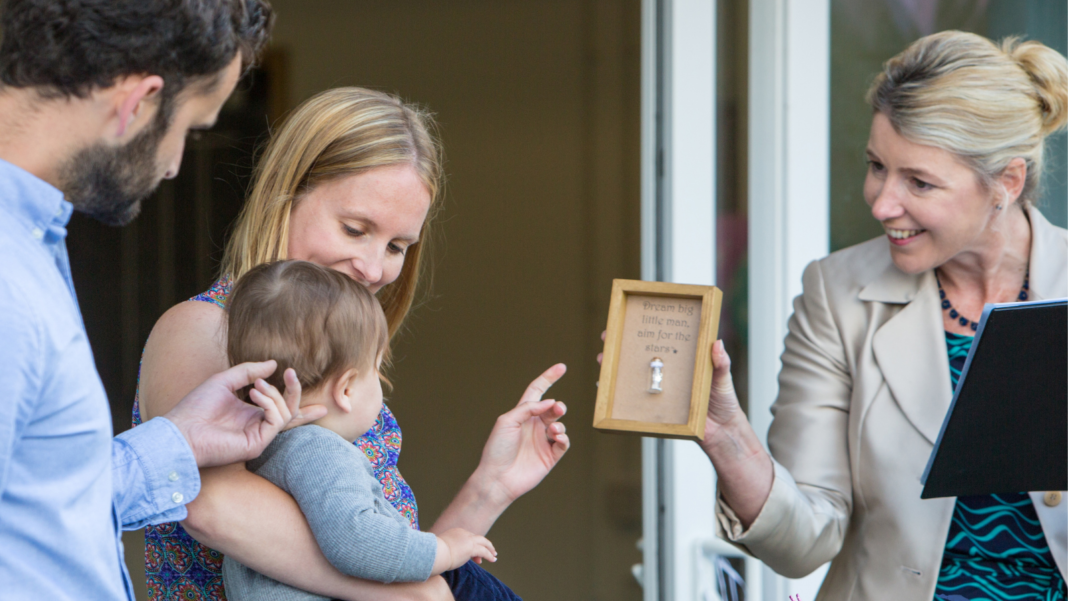
About humanist ceremonies
Humanist naming ceremonies are perfect for families who don’t follow any particular religion. By having a non-religious ceremony, you are emphasising your child’s freedom to decide what they believe as they grow older.
You can find out more about humanism on the Humanists UK website .
At what age does a humanist naming ceremony take place?
Humanist naming ceremonies mostly take place in the first year of a child’s life, with many ceremonies being held on the child’s first birthday. We also conduct naming ceremonies for children of all ages, including ceremonies for welcoming adopted children and stepchildren, coming of age, and change of name.
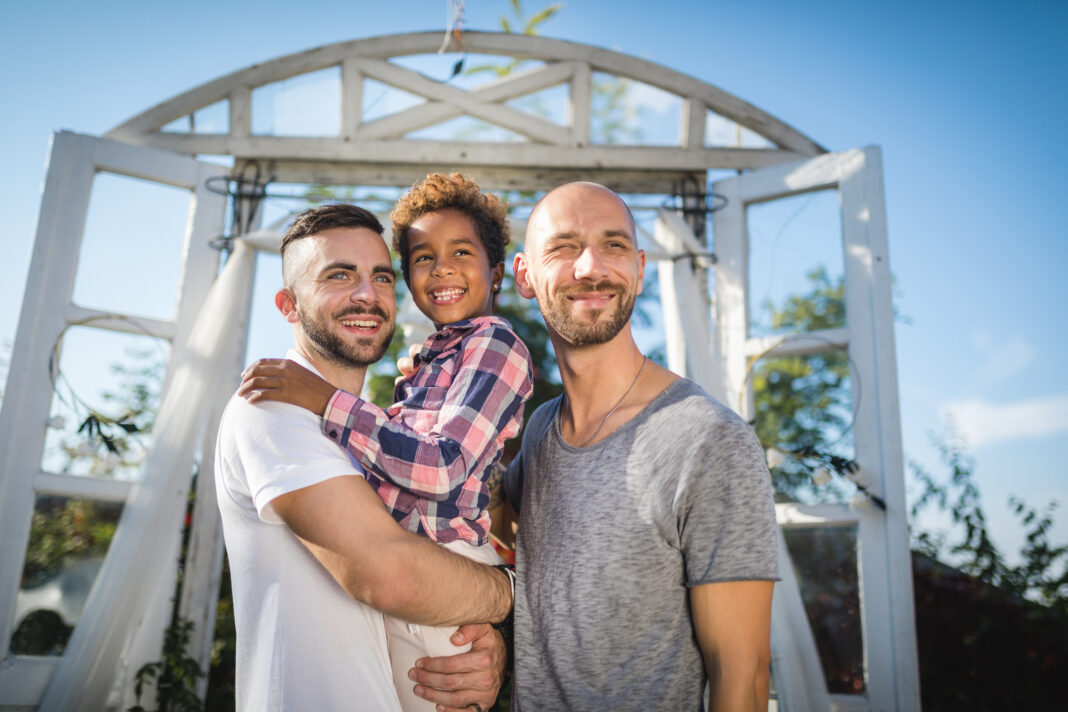
Naming ceremonies are not only for children. Our celebrants also conduct ceremonies for adults changing their name.
Find your local humanist naming celebrant
The role of the naming celebrant is to help you manage this process, let your creativity flow, and co-create the perfect day to celebrate your child.
The first step is to find your naming celebrant . Your local celebrant will be happy to discuss your unique celebration.
Further reading, tips, and ideas
- Frequently asked questions
- What is a humanist naming ceremony?
- What happens at a humanist naming ceremony?
- What’s the difference between a christening and a naming ceremony?
- Ten ideas for your child’s naming ceremony
- Poems for a humanist naming ceremony
- A socially distanced naming ceremony
Your humanist celebrant will write a unique script to celebrate the naming of your child.
Find interesting ways to create a unique ceremony that engages children and adults alike.
Sign up to Humanists UK emails
Sign up as a supporter and we'll keep you up to date by email about all of our work for a fair and equal society. See our Privacy Policy.
Postcode is optional but will help us send you information relevant to your local area.
In this section
What happens during a Naming Ceremony?
How does a Naming Ceremony differ to a Christening?
Can I include Godparents in the Naming Ceremony?
What is the celebrant role in a Naming Ceremony?
How do you choose your Naming Ceremony congregation?
Can we involve our other children in the Naming Ceremony?
Ideas for your Naming Ceremony
What is an Adoption Ceremony?
Can I have a transgender Naming Ceremony or Renaming Ceremony?
When and where should naming ceremonies be held?
Who is a Naming Ceremony for?
What is a Naming Ceremony?
What is a Naming Ceremony? A Naming Ceremony gives you a personalised, meaningful opportunity to celebrate – and welcome – your new addition to the family. It is a non-religious alternative to a formal Christening and is a way to officially name your child in front of your loved ones.
A Naming Ceremony will always be written entirely from scratch; each and every ceremony will be tailored around the family. They can also include any symbolic acts that might mean something to you and your family; this could include Sand Ceremonies, tree-planting or hand and foot printing.
During the ceremony, the parents will state their commitment to their child, thank their family and friends and announce their hopes for the child’s life.
This is what makes them so popular: they are a truly unique way to share your dreams and aspirations for your child’s future.
What can a Naming Ceremony be used for?
Essentially, Naming Ceremonies are all about welcoming a new addition to your family.
This could be a newborn child, step-children or an adopted child; the ceremony is suitable for babies, toddlers and older children. Whoever the Naming Ceremony is for, at its core the intention is to create a space where families and communities can come together to unite and bond, all in the name of this special person.
What are the benefits of a celebrant-led Naming Ceremony?
The benefits of a celebrant-led Naming Ceremony are enormous.
First of all, a Naming Ceremony will always be built around your family and their individual story. This adds a whole new dimension to the service, and provides a level of meaning and memories that cannot be found in a set script service.
Your celebrant will work with you to create the perfect ceremony. They will use their experience leading other ceremonies of this type, as well as their innate ability to listen and respond to your family needs, brought together with their confident communication and presentation skills to deliver a service that is totally befitting your little one.
Naming Ceremonies can also be an incredibly cathartic experience for children who are being brought into your family, such as step and adopted children. Officially announcing their place in your family to your loved ones is an important step, and one that will mean the world to the child.
Can a Naming Ceremony be religious?
Naming Ceremonies are usually not held in a church; however, due to the flexible nature of the ceremony, you do have the option to include or not include religious content.
If you want to incorporate religious content to your ceremony, it is important that you check with your chosen celebrant to make sure they are willing to do so.
Who can conduct a Naming Ceremony?
There are no legal restrictions for Naming Ceremonies, and so you can keep the ceremony “in the family” and have the service organised entirely by the parents.
However, most people opt to use a celebrant. A celebrant will help you write and arrange the ceremony, and then will lead all proceedings on the day.
You can browse our extensive range of celebrants in our Celebrant Directory .
Find a celebrant or venue today
S Q U I R R E L L Y M I N D S
Squirrelly Minds
keep it simple - make it beautiful
How to Plan a Naming Ceremony
April 25, 2018 Leave a Comment
I’m a minority in this blogging world because, ready for it? I’m not Christian. While I grew up Roman Catholic, I ventured onto my own path as an adult. For the most part this has been fine, but it was tricky when we had kids. Why? Baptism.
We wanted to recognize our children’s coming into the world in some official capacity, but were not interested in baptism. We prefer they choose their own religious affiliations, if any, when they’re older. This was a very difficult topic with my very religious parents. Given what it means to not baptize a child, I understand why it was upsetting, but this ceremony did not fit with our beliefs. We struggled to find an alternative until my sister told me about her friend’s naming ceremony. After looking into it a bit more, we knew this was the perfect way to celebrate our children in a non religious way.
Have someone perform the ceremony
For my parents, having a religious leader perform the ceremony was an absolute must. As I absolutely refused the roman Catholic priest, we went searching for someone with a much broader/more accepting outlook on religion. We found the perfect fit with a lay chaplain from the unitarian church here, which is very welcoming of everyone. This, once again, helped relieve my parents’ field that our children are not baptized (in their eyes our kids were baptized at their naming ceremonies, win win?). Anyhow, it does not need to be a religious figure by any means. It can be a family member or a close friend. Whomever it is, pick someone who knows you and your growing family, and whom you trust to always have your childrens’ best interest at heart.
Pick and involve your guardians
I don’t like the word ‘godparents’ for obvious reason, but I love the words in Portuguese which directly translate to little mother (madrinha) and little father (padrinho). My sister and her husband fulfill these roles, as well as legal guardians of our squirrelly kiddos. We incorporated this into the ceremony, including my sister saying a reading outloud.
Choose meaningful readings
It’s your ceremony, so you get to pick what is said. Pick something that is meaningful and fitting. For squirrelly boy’s ceremony, I read Children by Khalil Gibran (and cried through the whole thing), my sister read a celtic blessing in English, and the mister read a celtic blessing in gaelic. For squirrelly girl it was much the same, but I wrote a passage to read, my sister read a quote on siblings by Clara Ortega, and the mister read the same gaelic passage.
Involve your family
We already mentioned involving our children’s guardians in the ceremony, but if you have other children, involve them as well. After their madrinha read the passage on siblings, squirrelly boy gave his sister a tulip he picked from the guardian that morning. You could have the grandparents involved by lighting candles or honouring your child in some way. Or, like us, you could have a call and response where the person performing the ceremony read passages such as “Will you honour this child and help him/her grow into their own” while the guests respond with “We will”.
Include family and/or cultural traditions
I’m full on Portuguese, the mister is pretty well full on Celt. A lot of Portuguese traditions are tied to the church, so we had to be creative. A celtic tradition is placing a dab of whisky on the child’s forehead. To incorporate Portugal (and yes, a religious aspect), we cut the whisky with holy water my mom brought back from Fatima. For Estie, we dressed her in my baptismal gown. As mentioned earlier, we included celtic passages in our ceremony. You could choose any that are meaningful to your and your family to bring in those traditions.
Each of our ceremonies concluded with bubbles, nibbles, and cake!
Leave a Reply Cancel reply
Your email address will not be published. Required fields are marked *
Pin With Me

Follow Along
Get 10% off your first order! And be the first to get shop discounts and exclusive goodies

COMMENTS
A naming ceremony is a non-religious celebration that is used to introduce a newborn to family and friends. It is a more modern alternative to a Christening and can be tailored to the family's beliefs and values.
Cross-Cultural Naming Ceremonies: Rituals and Traditions from Around the World In societies worldwide, naming ceremonies are pivotal events that embody cultural, spiritual, and familial values, marking an individual’s integration into the community and cultural heritage.
Learn about the Naming Ceremony tradition for adults at any stage of life, and how Celebrants and Officiants create space for authentic identity through this important ritual. Like christenings and zeved habat, naming ceremonies are part of both spiritual and secular traditions.
A Naming Ceremony is a really important moment in your child's life – and an important memory for the family as a whole. It is the moment that you officially welcome a new person into the family in front of everyone you love, and a lot of people choose to give speeches at a Naming Ceremony.
This study observes the significance that indigenous names plays as a role in the social interaction of Federal Polytechnic Ede Undergraduate Students. This can be seen in the explanation of Umera-Okeke and Ezenma-Ohento (2010) which postulates that “….
A naming ceremony is a stage at which a person or persons is officially assigned a name. The methods of the practice differ over cultures and religions. The timing at which a name is assigned can vary from some days after birth to several months or many years.
A naming ceremony is a non-religious, secular, or sometimes semi-religious ritual held to celebrate and introduce a newborn child to their family, friends, and community. It is an alternative to religious baptisms or christenings, making it inclusive and suitable for families of many different beliefs and backgrounds.
Humanist naming ceremonies are perfect for families who don’t follow any particular religion. By having a non-religious ceremony, you are emphasising your child’s freedom to decide what they believe as they grow older.
What is a Naming Ceremony? A Naming Ceremony gives you a personalised, meaningful opportunity to celebrate – and welcome – your new addition to the family. It is a non-religious alternative to a formal Christening and is a way to officially name your child in front of your loved ones.
With the guidance of the same lay chaplain who performed our wedding, we sculpted two beautiful naming ceremonies that perfectly suited us while also appeasing to the religious side of things, without being religious. Here are some guidelines that can help you plan your own: Have someone perform the ceremony